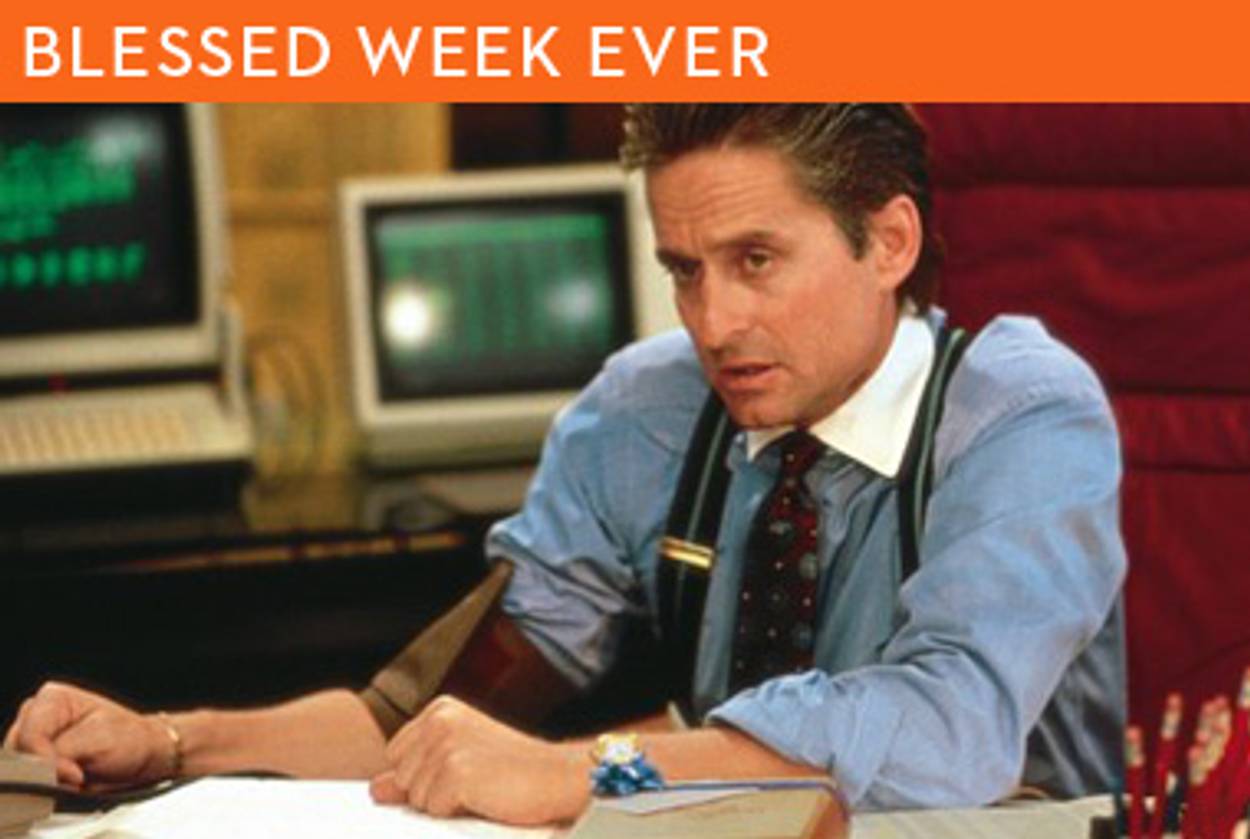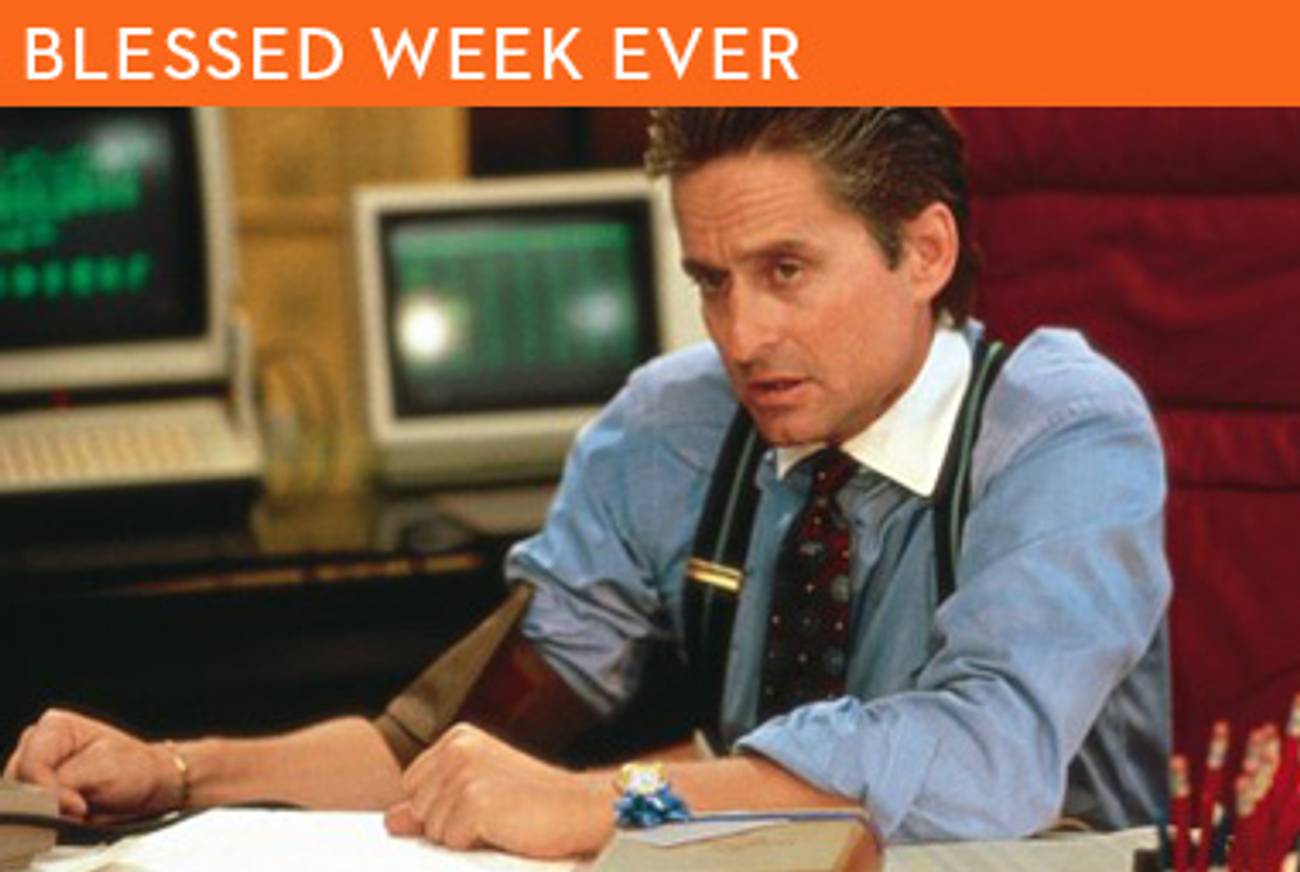With a Vengeance
A haftorah of jealousy and judgment




While ambling in downtown Manhattan a few months ago, I noticed a commotion a block or two away. Through the gaps between the large white trucks that blocked the street I could see people rushing in and out of a caravan of white trailers, some carrying bulky equipment and others barking into two-way radios. It could only mean one thing: a film was in production.
In of itself, this is no big deal for most Manhattanites. Living on the Upper West Side, I sometimes find myself darting past piles of young actors playing corpses for the various Law & Order installments that have made the neighborhood their perpetual playground, and a star appearance on my block by George Clooney a few years back did more to acquaint me with my neighbors than had eight years of living under one roof. But that day downtown, things were different. The little yellow signs posted everywhere detailed the production’s title: Wall Street 2: Money Never Sleeps.
I am a child of the 1980s, and so the original Oliver Stone drama had a deep impact on my developing psyche. It taught me that it’s cool to be a greedy, self-obsessed moron with little or no regard for anything but his immediate material needs. This being the quintessential message 11-year-old boys everywhere yearn to hear, I spent considerable chunks of time in the sixth grade channeling my inner Gordon Gekko, the evil tycoon portrayed with much gusto by Michael Douglas. I borrowed one of my father’s tattered blazers, badgered my parents for a subscription to Globes, Israel’s premiere financial paper, and did my best to always sound as if I was on the cusp of launching a hostile takeover of a competing conglomerate. It didn’t do much for my social standing in elementary school; thankfully, a year later Big came out and provided me with a much more child-friendly model of a business executive.
Gekko’s famous catchphrase from the first film was “greed is good.” It’s a sentiment that echoes far more feebly in today’s America, ravaged as it is by the financial implosion of the last two years. Greed, we’ve all learned the hard way, may be many things, but good is never one of them. Stone knows that: According to reports, the new film recasts Gekko as a repentant capitalist working to warn the rest of the world of the coming economic disaster. If it’s not too late, the director may want to send his screenwriter a copy of this week’s haftorah. It’s a famous one: after asking the Lord for wisdom in a dream, King Solomon is approached by two women, each claiming that a certain baby is hers. Solomon famously orders the baby cut in half, and watches as the real mother surrenders her claim so as not to harm the child.
While we celebrate the king’s nimble mind, we too often ignore the story’s true, gritty meaning, namely that one woman was willing to let an infant be halved rather than admit defeat and let another woman triumph.
Little, it seems, has changed since biblical times. In it annual roundup of the year’s most notable ideas, The New York Times Magazine wrote about a phenomenon called Drunken Ultimatums, observed by researchers from Carnegie Mellon University and Duke. The scientists recruited two participants, and introduced them to a simple game: one participant would be given a sum of money, and would then have to offer a portion of that sum to his partner. If the partner agrees, both participants keep the cash; if he or she refuses, however, both walk away empty-handed. To make the experiment a bit more interesting, a bit of booze was introduced into the equation.
“The scholars were interested in drunkenness because intoxication, as other social-science experiments have shown, doesn’t fuzz up judgment so much as cause the drinker to overly focus on the most prominent cue in his environment,” wrote Christopher Shea. “The most prominent cue, in this case, being money, the hypothesis was simple: if people truly care more about their long-term goals, they’d take the money, no matter how much or how little was being offered. If, however, they cared more about revenge—similar experiments had shown that most participants tended to reject the monetary offer, finding it to fall short of their expectations—they’d reject the pay and take satisfaction instead in seeing their partner lose cash as well.
The results should come as little surprise. “In both setups,” writes Shea, “drunken players were less likely than their sober peers to accept offers of less than 50 percent of the total. The finding suggests, the authors said, that the principal impulse driving subjects was a wish for revenge.”
The evil mother, then, the one willing to see the baby cut in half, is not evil at all. She is human, acting like humans always have and always will. It is Solomon who is otherworldly and foreign. After he passes his judgment, the haftorah tells us, “all Israel heard of the judgment which the king had judged; and they feared the king; for they saw that the wisdom of God was in him to do judgment.”
Humbling words. Impartiality, which we might assume to be governing official human environments such as the courthouse, the state house, and the marketplace, is presented instead as something foreign, fearful, and divine. Like the social scientists with their boozy ultimatums, the Israelites, too, know that to be human is to be petty and vengeful, to sacrifice one’s own good for the pleasure of witnessing another’s misfortune.
Which, frankly, makes me miss Gordon Gekko. He, at least, was only greedy. And while greed may not be good, it is often be rational, even innocuous, as its sole interest is the continuous acquisition of more assets; put no major moral obstacles in its way, and it’s nothing but a never-ending treasure hunt. But revenge is mad, and maddening, and mercurial, delivering nothing but misery and horrors. Let us consider that the next time some offers us a stiff drink and cold, hard cash.
Liel Leibovitz is a senior writer for Tablet Magazine and a host of the Unorthodox podcast.
Liel Leibovitz is editor-at-large for Tablet Magazine and a host of its weekly culture podcast Unorthodox and daily Talmud podcast Take One. He is the editor of Zionism: The Tablet Guide.